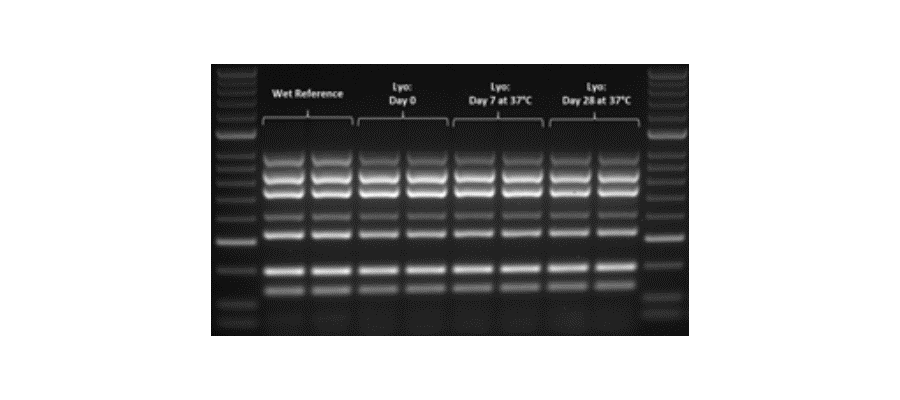Glycerol-Free High-Fidelity Pfu (HC)
PCR is used for the amplification of a next-generation sequencing (NGS) library. In addition to increasing the amount of DNA, the PCR amplification step is also used for DNA target enrichment for fragments that have an adaptor-ligated to each end. These will be the fragments that attach to the flow cell and will be sequenced, so it is important that this PCR amplification step does not introduce mutations to the NGS library, as a lower error rate means that less sequence coverage is required, saving expense and time.
Have questions about a product?
Contact us to learn more about Meridian’s molecular or immunoassay reagent portfolio. We want to hear from you!
Multiplex amplification

Glycerol-Free High-Fidelity Pfu (HC), was lyophilized with Lyo-Ready Pfu Reaction Buffer, 5x and stored at 37°C for 7 and 28 days. Lyophilization samples were tested in multiplexed PCR amplification of 7 targets (793 bp, 649 bp, 548 bp, 418 bp, 332 bp, 196 bp, 135 bp) against the same enzyme and reaction buffer without lyophilization (Wet Reference) to demonstrate stable after lyophilization allowing for extended storage periods and use in NGS library amplification.
Glycerol-Free High-Fidelity Pfu (HC), MDX203
Glycerol-free, high concentration, high fidelity DNA polymerase with separate dilution and reaction buffer, ideal for NGS library amplification and gene expression. Ideal for lyophilization.
Documents & Resources
Description
High-Fidelity Pfu is a thermostable high fidelity DNA polymerase enzyme, isolated from Pyrococcus furiosus. The Pfu polymerase enzyme replicates DNA in the 5´→3´ direction in the presence of magnesium, but also possesses 3´→5´ exonuclease (proofreading) activity. Base misincorporations that may occur during polymerization are rapidly excised by this proofreading activity. High-Fidelity has an error rate of 3.0 x 10-6 generating blunt-ended amplicons up to 5 kb in length. Glycerol-Free High-Fidelity Pfu (HC) is supplied in a glycerol-free storage buffer and is accompanied by a 5x Reaction Buffer that contains magnesium, dNTPs and excipients required for lyophilization.
Specifications
| Description | High concentration, high-fidelity Taq DNA polymerase with separate Pfu Polymerase Dilution Buffer and10x Pfu Reaction Buffer. |
| Concentration | 20 U/µL |
| Appearance | Clear, colorless solution |
| Application | PCR, NGS library preparation, cloning, protein expression |
| Sample type | cDNA, DNA |
| Presentation | 3 vials |
| Storage | -20 °C |
| Mix stability | See outer label |
| Consistency | ± 0.5 Ct variance between test and reference sample |
| DNA Contamination | None detected in PCR amplification with traces overlay with the negative control on E. coli and mouse genomic DNA specific targets. |
| DNase Contamination | No detectable degradation |
Catalogs & Brochures
Reagent Solutions for Molecular DiagnosticsReagent Solutions for Molecular DiagnosticsCatalog
High-Specificity Pfu HS MixHigh-Specificity Pfu HSCatalog
Next-Generation Sequencing (NGS)Next-Generation Sequencing (NGS)Catalog
A Comprehensive Guide to Essential Reagents for High-Throughput Molecular Diagnostic Assays (MDx)Accelerating Efficiency: A Comprehensive Guide to Essential Reagents for High-Throughput Molecular Diagnostic Assays (MDx)
FAQs: High-Fidelity Pfu
In nature, the ability of a DNA polymerase to correct misincorporation of nucleotides in the DNA strand being elongated is often crucial to the survival of the host organism. This ability is termed “proofreading activity” and occurs in the 3′ to 5′ direction. This activity also leads to the polymerase removing unpaired nucleotides overhanging at the 3’end (A-overhangs), creating blunt ends.
If possible, we would recommend an additional clean-up of affected samples, alternatively High-Specificity Pfu HS Mix (MDX006) would be recommended, as it is designed to work in the presence of inhibitors.
High-Fidelity Pfu has been validated for templates up to 5 kb.
DNA target enrichment is a pre-sequencing DNA preparation step where DNA sequences are either directly amplified (multiplex PCR-based) or captured (hybrid capture-based). These enriched DNA fragments can then be sequenced using DNA sequencers.
A lyophilized PCR molecular test will remain stable for up to 2 years at ambient temperature if correctly stored in sealed pouches.
Get In Touch With A Specialist
Have questions about a product? Want to learn more about Meridian’s molecular or immunoassay reagent portfolio? We want to hear from you!